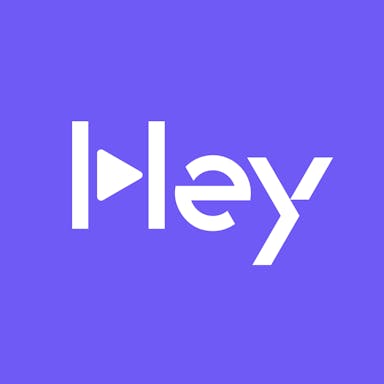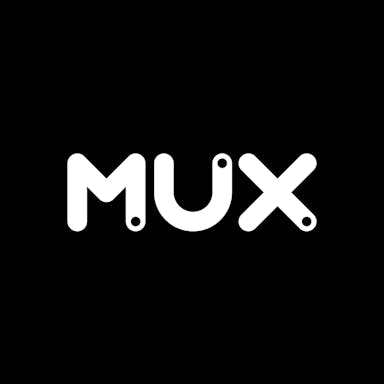Thesis
There has been a steady increase in the number of hours that people spend watching online videos each week. In 2022, people spent 19 hours, up from 10.5 hours in 2018. As a result, businesses have increasingly used video as a key channel to reach new customers, increase user engagement, and strengthen their brand. In 2023, 91% of users expressed a desire to see more content from businesses.
In a global survey conducted in late 2023, over 90% of marketers indicated that they used video as a marketing tool—a record high since 2016, when only 61% of businesses were leveraging video. These marketers used videos for a variety of purposes, including video testimonials, product demos, and sales videos. 88% indicated that videos helped them increase customers’ understanding of their products and services, 90% said they helped increase brand awareness, and 87% said videos have directly increased sales in 2023.
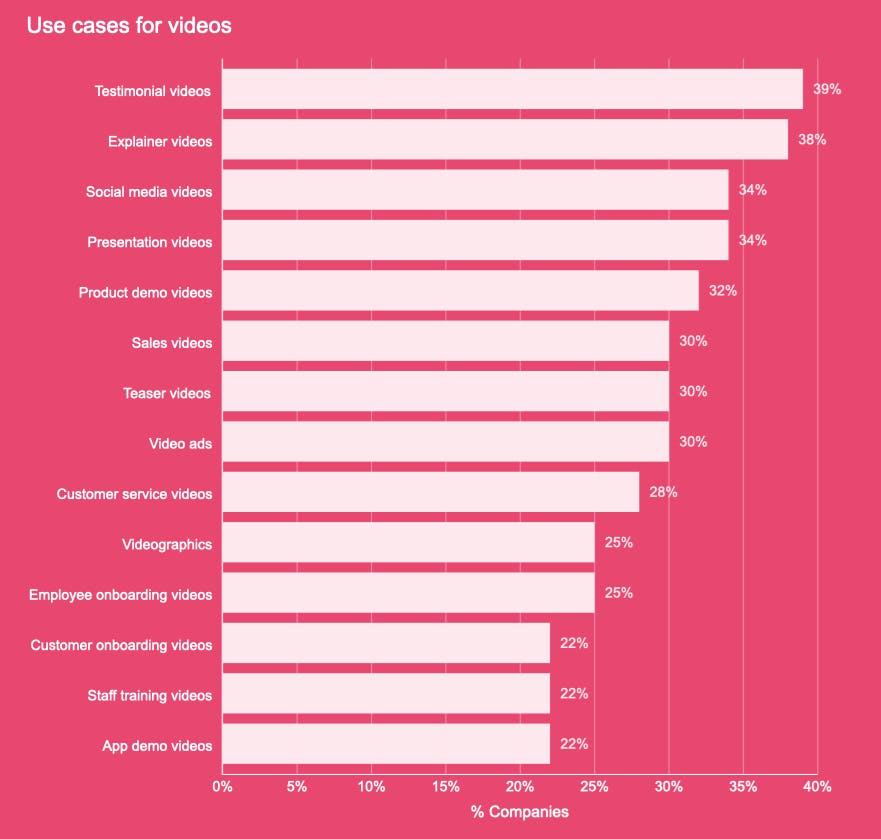
Source: Wyzowl
However, not all businesses have been able to access the benefits of video marketing. Some face barriers because they find video production too time-consuming or expensive. In fact, creating one minute of a marketing video is estimated to cost $1K due to the need to script, cast, scout, produce, post-produce, and re-shoot videos.
HeyGen provides an AI-powered video generation and translation platform that enables businesses and individuals to produce videos at lower cost, faster speeds, and for wider audiences. Approximately 75% of marketers say they have used AI tools to create or market videos, suggesting an appetite to adopt this kind of technology. In an influencer and creator economy, brands value the ability to craft compelling stories and connect with customers. HeyGen’s products include features to personalize and humanize avatar videos, select the pitch and speed of AI-generated audio, and offer a number of templates from which users can build videos.
Founding Story
HeyGen was founded by Joshua Xu (CEO) and Wayne Liang (Chief Innovation Officer) in Shenzhen in December 2020 under the name Surreal.
Xu and Liang both attended college at Tongji University in Shanghai and pursued master’s degrees at Carnegie Mellon University. After their studies, they both moved to the West Coast in 2014, Xu working as a software engineer at Snap and Liang as a product designer for karaoke app Smule. Xu stayed at Snap for six years, the last two of which he spent working on Snap’s advertising team to support AI integration and develop an AI-augmented camera. In this role, he realized how high-quality artificially generated videos could be and became interested in applying this to content creation. His experience working with mobile cameras exposed Xu to the challenges of creating quality content, such as the need for on-camera skills, a budget for production, and the time and resources to record and edit videos.
While generative AI was still nascent in the late 2010s, Xu and Liang were convinced that AI could revolutionize content creation, so they quit their jobs in 2020 with the goal of starting a company to leverage the potential of AI in transforming visual storytelling.
Initially, the team decided to focus on creating AI-generated spokesperson videos, which are marketing videos in which a person introduces a business, product, or service. In 2021, Xu and Liang raised a seed round from Sequoia China and ZhenFund to build Surreal. Surreal offered software that helped enterprise customers generate new images or video content and amassed around 10 million “photo and video orders” as of March 2021.
In 2022, the co-founders moved the company to Los Angeles under a new name, Movio, in an effort to access advanced semiconductors to train their AI systems and target US enterprises such as Salesforce, Amazon, and Nvidia. Following scrutiny from American lawmakers for the company’s connections to China, the company asked its Chinese investors to sell shares to US counterparts and fully dissolved its Shenzhen entity in 2023.
In April 2023, the company rebranded once again as HeyGen, this time as part of its shift from offering just spokesperson videos towards a more comprehensive video generation experience. The company also added new members to its leadership team. Dave King, former Chief Marketing Officer of Asana, joined as Chief Business Officer in March. Then, in June, Rong Yan, former VP of Engineering at HubSpot, joined as Chief Technology Officer, and Lavanya Poreddy from Match Group and Meta joined as Head of Trust and Safety.
Product
HeyGen aims to simplify the content creation process, helping users produce studio-quality videos with AI-generated avatars and voices.
Avatar Video
Users choose an avatar, give it a voice (including pitch and talking speed), then write a script to produce a video in minutes. Avatars are digital representations of people and can simulate human-like behaviors, expressions, and interactions. Users have the option to create their own avatars by recording themselves, selecting an animated photo avatar, or selecting an avatar that is modeled after paid actors. As of January 2025, the platform offers over 120 avatars, 300 voices, and 300 templates that allow users to make adjustments to backgrounds. These videos can be used for various purposes, such as product marketing, sales outreach, online education, and virtual training.
In April 2025, HeyGen released Avatar IV as a new feature that enables users to create short, lifelike videos by uploading a single photo and either writing a script or providing an audio file. Utilizing a diffusion-inspired audio-to-expression engine, it generates photorealistic facial movements based on vocal tone and rhythm, offering a quick and simplified video creation process without the need for complex editing.
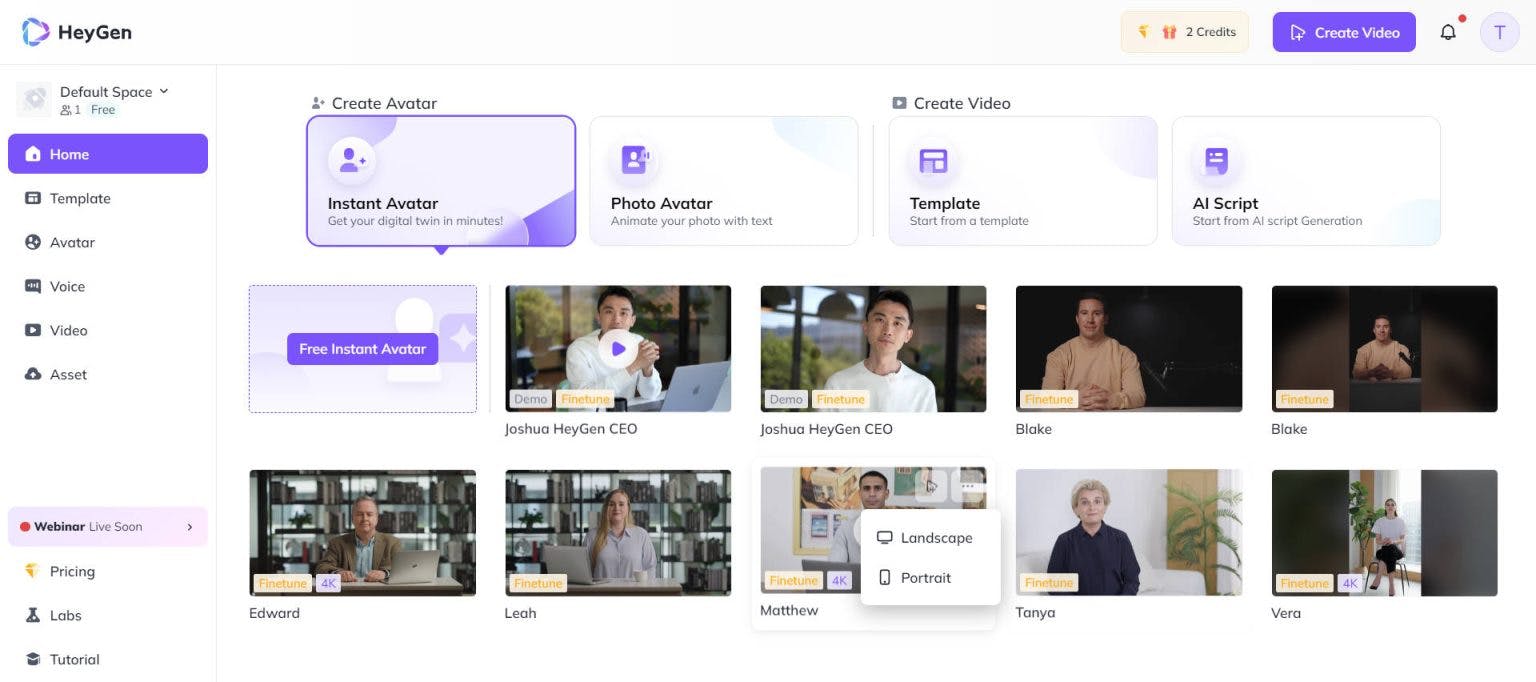
Source: Elegant Themes
In the past, HeyGen had provided personalized video messages by leveraging AI and automation to create customized videos for each person on a contact list without filming the same video multiple times. However, in January 2025, HeyGen announced that it was sunsetting the product. The company plans to integrate personalized video capabilities into its core product suite instead. As a result, features like email sending, CSV uploads, hybrid mode, and scrolling website video templates are being temporarily deprioritized. Users are encouraged to utilize alternatives such as Google Sheets combined with Zapier for similar functionalities.
Video Translation
Users can upload any video they have and translate it to any of the over 70 languages and 175 dialects that HeyGen offers. The video language translator uses AI to transcribe the audio from a video into text, translate the text into a desired language, and then add back the translated script into the video as subtitles or dubbed voiceovers that mimic the selected accent and the original speaker’s natural intonations. Users have the ability to proofread and edit the translated videos, upload voice recordings to train the AI on pronunciation, and adjust scripts by directly editing the video’s plaintext files. With this tool, customers can reportedly translate videos much faster than traditional products and reach new audiences by overcoming language barriers.
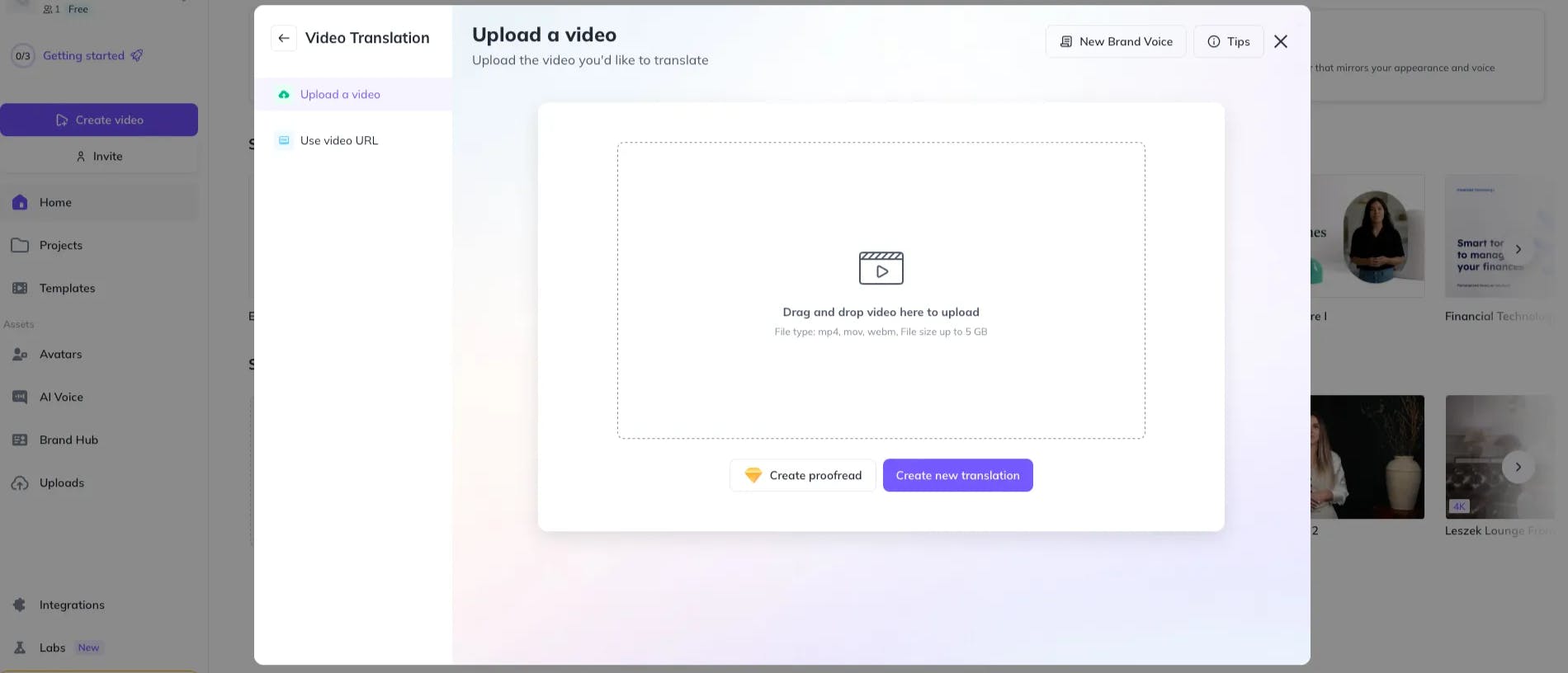
Source: HeyGen
Interactive Avatar
Interactive avatars enable real-time conversations that replace automated responses or chatbots. Users select an avatar, then train the avatar by recording themselves showing neutral expressions and modeling various behaviors like active listening and speaking. Using computer vision and speech synthesis, the avatar then copies users’ motions and speech, including subtle facial expressions and hand gestures, to produce organic interactions. Users can also write prompts to the product to provide guidance on details like the persona it adopts (e.g., a customer service assistant at an online retail store) or the length and type of replies it gives.
HeyGen offers this tool via an Interactive Avatar API suite that can be added to any website or product. Interactive avatars have been used for a variety of purposes, such as customer support, sales calls, or coaching sessions. The avatars can even be sent to Zoom meetings in lieu of users.
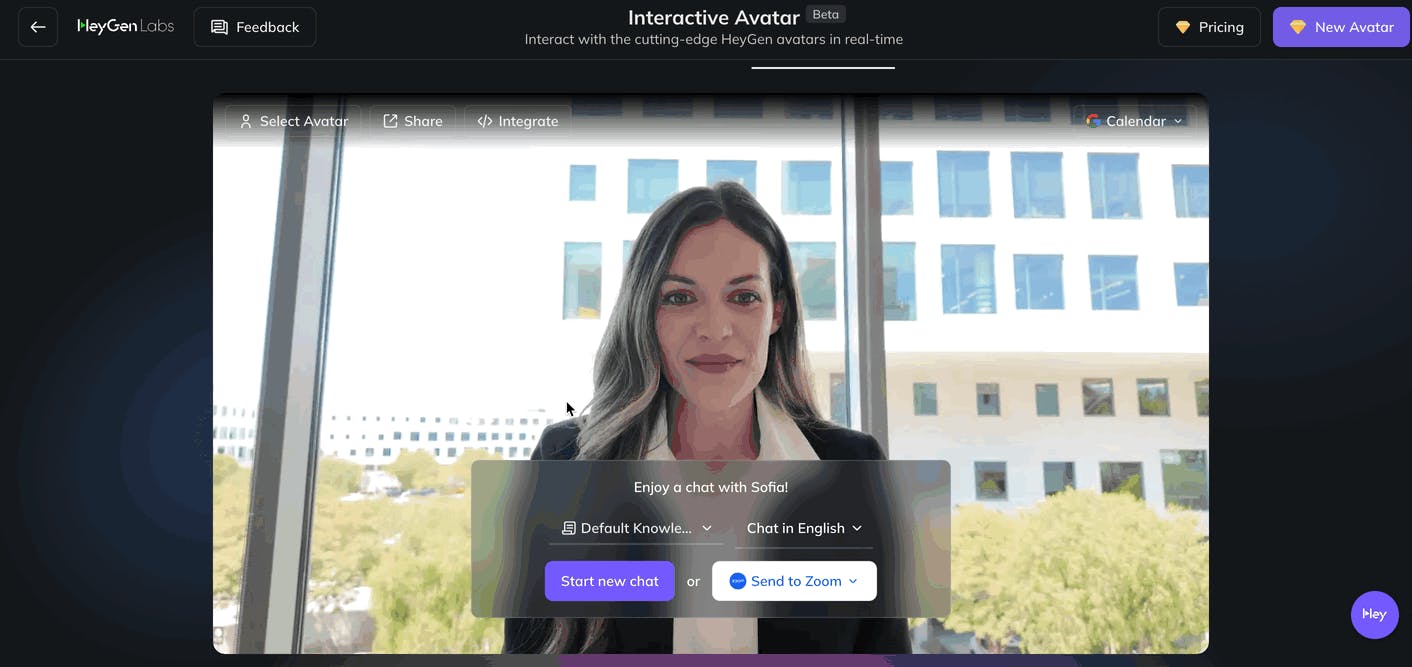
Source: HeyGen
In August 2024, HeyGen added 50 new digital actors to its photo and interactive avatar selection, increased the number of looks that avatars can have, improved the range of emotions they show, and added a function for users to create new avatars from uploaded photos or descriptions (e.g., a climber wearing a yellow jacket).
Market
Customer
With a mission to “make visual storytelling accessible to all,” the company has served a variety of customers, including manufacturers, small businesses, global non-profit organizations, Fortune 500 companies, and individuals. HeyGen’s CEO, Joshua Xu, describes a key advantage of the company’s platform as its ability to serve a diverse customer base.
One notable use case was McDonald’s “Grandma McFlurry” campaign in June 2024. The campaign showed people using HeyGen’s video translation product to overcome language barriers with their grandparents and share a “sweet connection” with them. Another was its partnership with the United Nations Development Program on its Weather Kids campaign in March 2024. The campaign used HeyGen’s video avatars to create a weather forecast from the year 2050 that was delivered by kid meteorologists. A final example is when an English version of Argentinian President Milei’s speech at the World Economic Forum in January 2024 was posted on X and went viral. Milei’s speech, delivered in Spanish, was translated into English using HeyGen. Comments expressed surprise at the accuracy of the lip sync and HeyGen’s ability to maintain his accent in the translated version. These examples demonstrate the variety of audiences and purposes that HeyGen’s products serve.
Market Size
In 2024, YouTube was the second most visited site in the world and surpassed one billion hours of views per day. These hours go towards a variety of purposes. In the US, 32% of adults got their news from YouTube in 2024, up from 23% in 2020. Meanwhile, for the 95% of US teens who used YouTube in 2022, the platform was a helpful search engine to learn new information. Also, across the globe, usage of YouTube for content marketing increased from 55% to 67% between 2022 and 2023. Regardless of geography or demographics, videos have succeeded in engaging their audiences.
Furthermore, users are not only consuming more video content, but also watching better quality content. In 2024, there was a 35% increase year over year in the share of videos that were uploaded in 4K resolution, suggesting that creators are increasingly prioritizing high-quality videos. This is especially true for marketers. In one 2022 survey, 84% of B2C marketers around the world indicated that they differentiate themselves from the competition by creating better quality content. And in 2023, over 80% of marketers saw AI as a tool to help them improve their ability to enhance customer service and improve targeted advertising.
As demand for more and better quality videos increases from video consumers and creators, respectively, the global AI video generator market size is expected to grow to $1.9 billion by 2030. This growth may accelerate as AI-generated video becomes more commonly accepted. In November 2023, one investor pointed out that “we’re at 0.1% penetration of people even understanding this is possible, much less adopting it.”
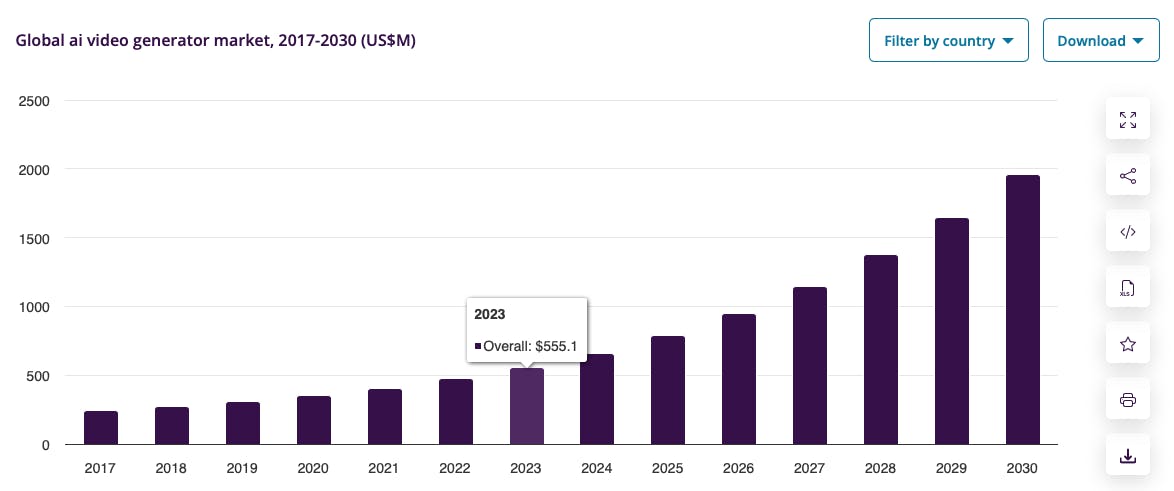
Source: Grand View Research
Competition
HeyGen faces competition from established companies like Adobe, large-scale startups like OpenAI, and similar early-stage startups. According to reviews from sites like G2, HeyGen often ranks higher than competitors across ease of use and quality of support services in particular.
Adobe
In October 2024, Adobe launched its FireFly Video Model, a text-to-video content generator that advanced its broader efforts to integrate AI into its product portfolio. FireFly allows users to create and edit video using a variety of camera controls that enable users to film from various perspectives, fill gaps in video timelines by using text prompts and reference images that generate B-roll, and add new elements (e.g., background, smoke, etc.) to existing footage. Key benefits that the company emphasizes are that it offers this tool among other Adobe applications that users already have in place and that it trains its AI only on data over which it has copyright. As of May 2025, Adobe had integrated FireFly into its existing video editing platform, Premiere Pro, with features such as Generative Extend for seamless clip extension, intelligent audio cleanup, and automatic caption translation.
OpenAI
In February 2024, OpenAI introduced Sora, a text-to-video generator, to a shortlist of designers, filmmakers, artists, and people who could assess the potential harms of the model. In December 2024, it launched Sora Turbo, an updated and faster version that has more features. This new model can remix videos by replacing, removing, editing existing content, extending existing frames, and reorganizing a video's sequence. As of December 2024, Sora Turbo was made available to ChatGPT Plus and Pro accounts free of charge, though it was briefly paused due to excessive demand. Users are able to create videos of up to 1080p resolution and up to 20 seconds long. In 2025, OpenAI plans to roll out tailored pricing for different types of Sora users.
Runway
Runway, founded in January 2018, is an applied-AI research company that offers an AI-powered text-to-video and video editing platform. The company had raised $544.5 million as of May 2025 from investors including General Atlantic, Google, Nvidia, Salesforce Ventures, and Lux Capital. In April 2025, Runway raised a $308 million Series D at a $3 billion valuation.
In July 2024, Runway released a video generation tool called Gen-3 Alpha, which included advanced camera controls that enable better transitions between frames, photorealistic humans that mimic real-life emotions and gestures, and customization features that allow users to adapt the tool to industry needs. Gen-3 drew some criticism over the alleged use of copyrighted material in its training data.
In April 2025, Runway released Gen-4, which aims to improve continuity in AI-generated videos by maintaining consistent characters and objects across multiple shots. The model allows users to input a reference image and written prompts to generate scenes from different angles while preserving visual consistency. It is currently being rolled out to paid and enterprise users.
Runway is sometimes considered one of the more expensive products in this market, priced on a certain number of usage credits each month. As opposed to HeyGen’s focus on non-technical users trying to more easily create video content, many of Runway’s users are professional video creators.
DeepBrain AI
Founded in June 2016, DeepBrain AI provides AI avatars and a video generator to create short and long-form videos from text. As of May 2025, it has raised a total of $52 million over three funding rounds from investors like the Korea Development Bank and IMM Investment. DeepBrain AI offers a platform meant to be accessible to those without deep technical knowledge that integrates into ChatGPT and can enable users to brainstorm and translate ideas into videos. It offers a similar set of capabilities as HeyGen, including video translation in over 80 languages. However, DeepBrain AI’s avatars are not deemed as realistic as those of competitors.
Synthesia
Synthesia is a UK-based company founded in April 2017. As of May 2025, the company had raised a total of $336.6 million over five funding rounds. The company offers a text-to-video tool that offers similar features to HeyGen, including customizable avatars, video translation in over 140 languages, and personalized videos. It is different from HeyGen in that it offers a real-time collaboration platform so that teams can create videos together or share avatars and scenes for branding purposes. It is also dissimilar in that it lacks HeyGen’s interactive avatars and broad suite of integrations. Synthesia is slightly cheaper than HeyGen, offering a free plan then a paid plan that starts at $18 per month.
Business Model
HeyGen offers a tiered pricing model for its web application. Users can choose a free plan that contains all the main functions but limits the videos that can be produced to three videos per month with a three-minute limit. Under this plan, users have access to up to five photo avatars, one customizable avatar, over 700 AI voices, and over 400 video templates. To unlock premium features, users can transition to paid plans. The Creator plan is $29 per month and allows users to create five-minute videos with a greater variety of photos and custom avatars. The next tier is a $39 per-seat-per-month Team plan, which offers videos with higher resolution and more advanced video editing capabilities. The final tier is a customizable Enterprise plan that provides fast processing speed and the opportunity to create unlimited videos with all available features.
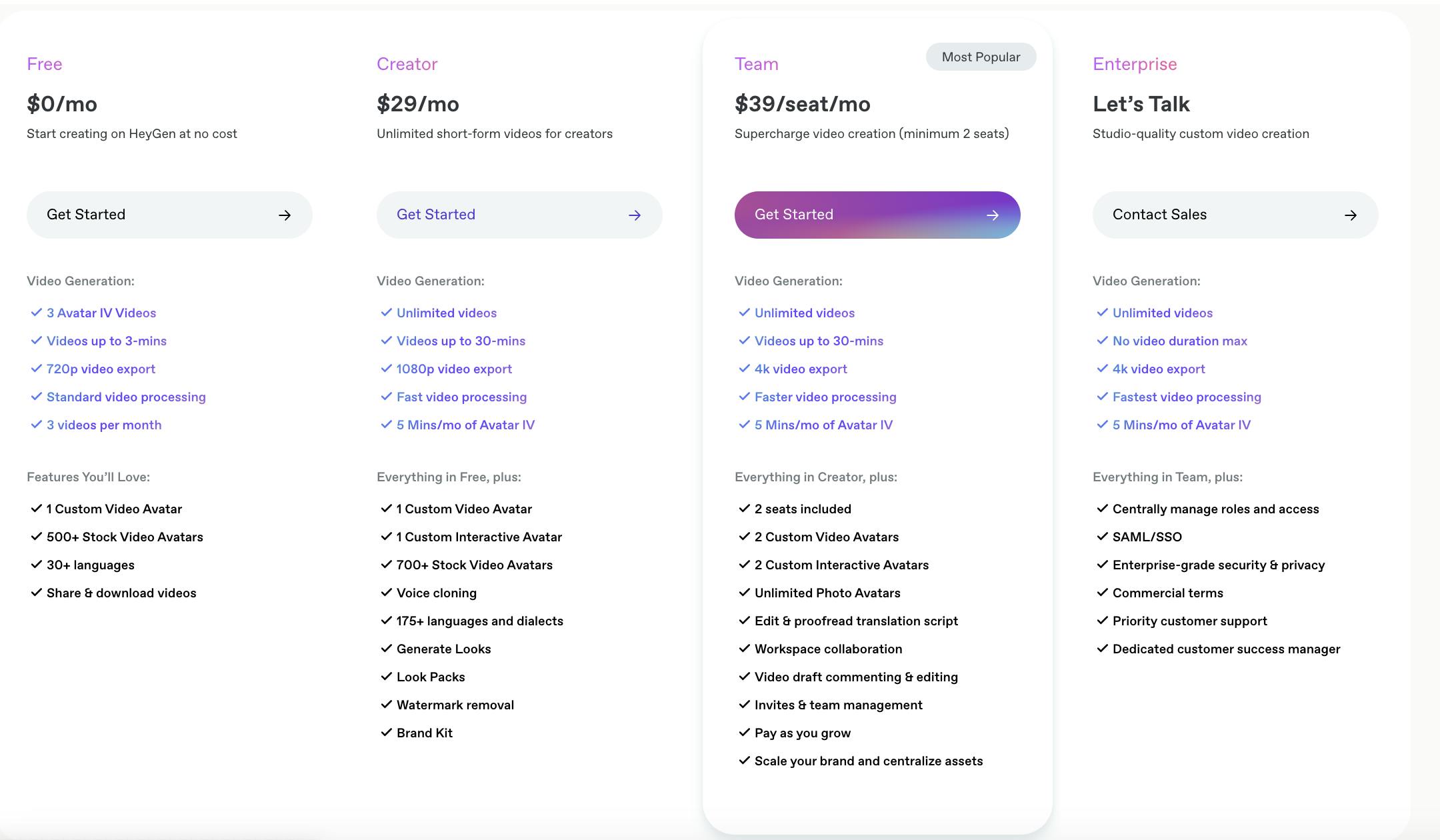
Source: HeyGen
For its APIs, HeyGen offers a tiered, credit-based pricing model where each video or animation consumes credits that must be used within a month of purchase. The free plan offers 10 free credits per month to use the video generation and interactive avatar APIs. The Pro plan offers 100 credits for $99 per month for longer videos with no watermarks. The Scale plan offers 660 credits for $330 per month for users to access the video translation API. Finally, the Enterprise plan is similarly customizable, enabling customers to negotiate a price to access the full API suite.
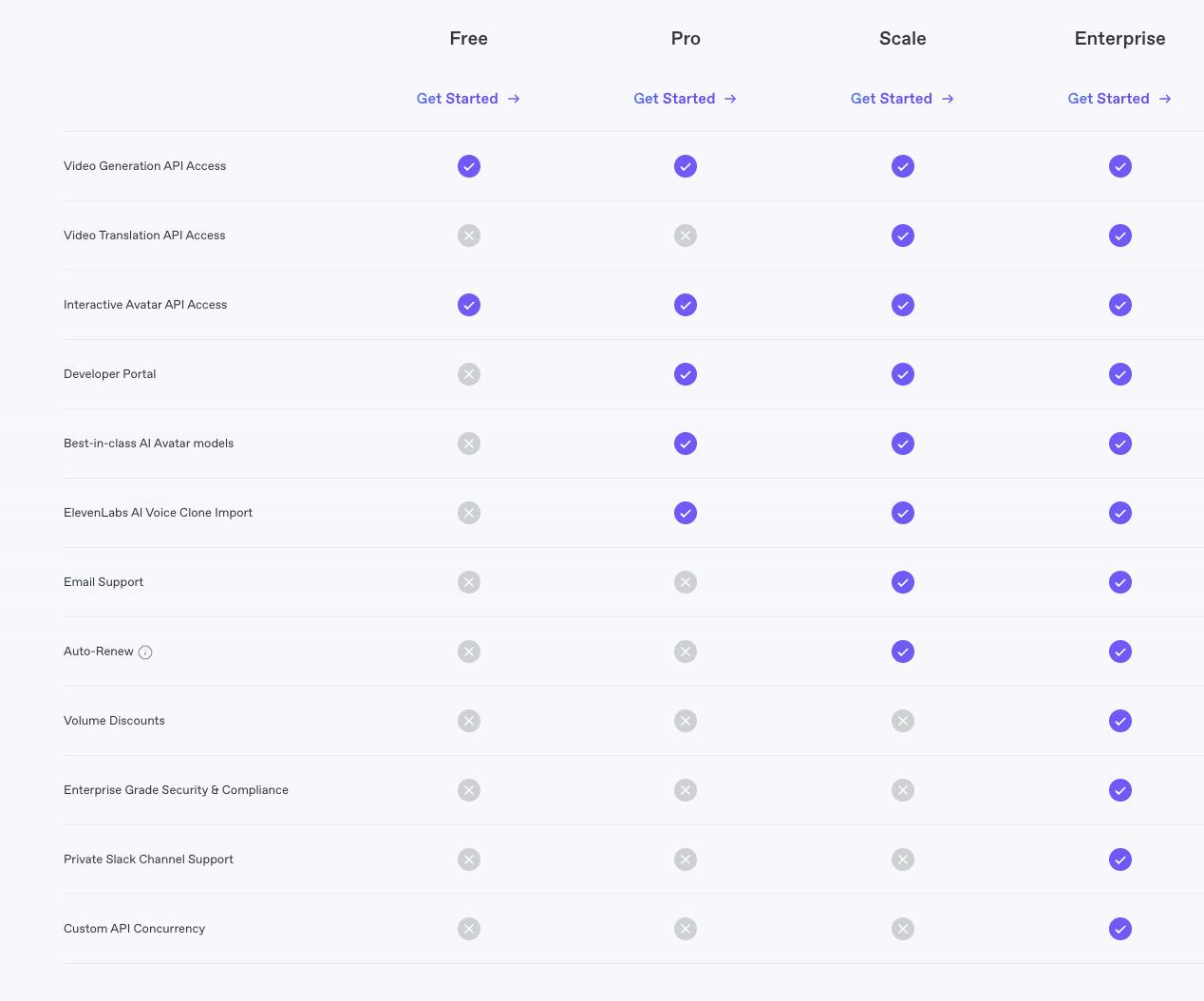
Source: HeyGen
Traction
HeyGen took just 178 days to get to $1 million ARR. It launched its first video generation product in July 2022 under a freemium model with the caveat that there would be a relatively large watermark on videos. This approach was intended to spread awareness and acquire more users, and it worked. After launch, the company’s system crashed three times in the first few months as user-generated videos received millions of social media views. In March 2023, HeyGen reached $1 million ARR, before growing to $10 million in October 2023 and over $35 million in just over a year. As of May 2025, HeyGen has served over 85K customers globally and has been profitable since Q2 2023. To maintain momentum, the company has kept a weekly release schedule since its first product launch.
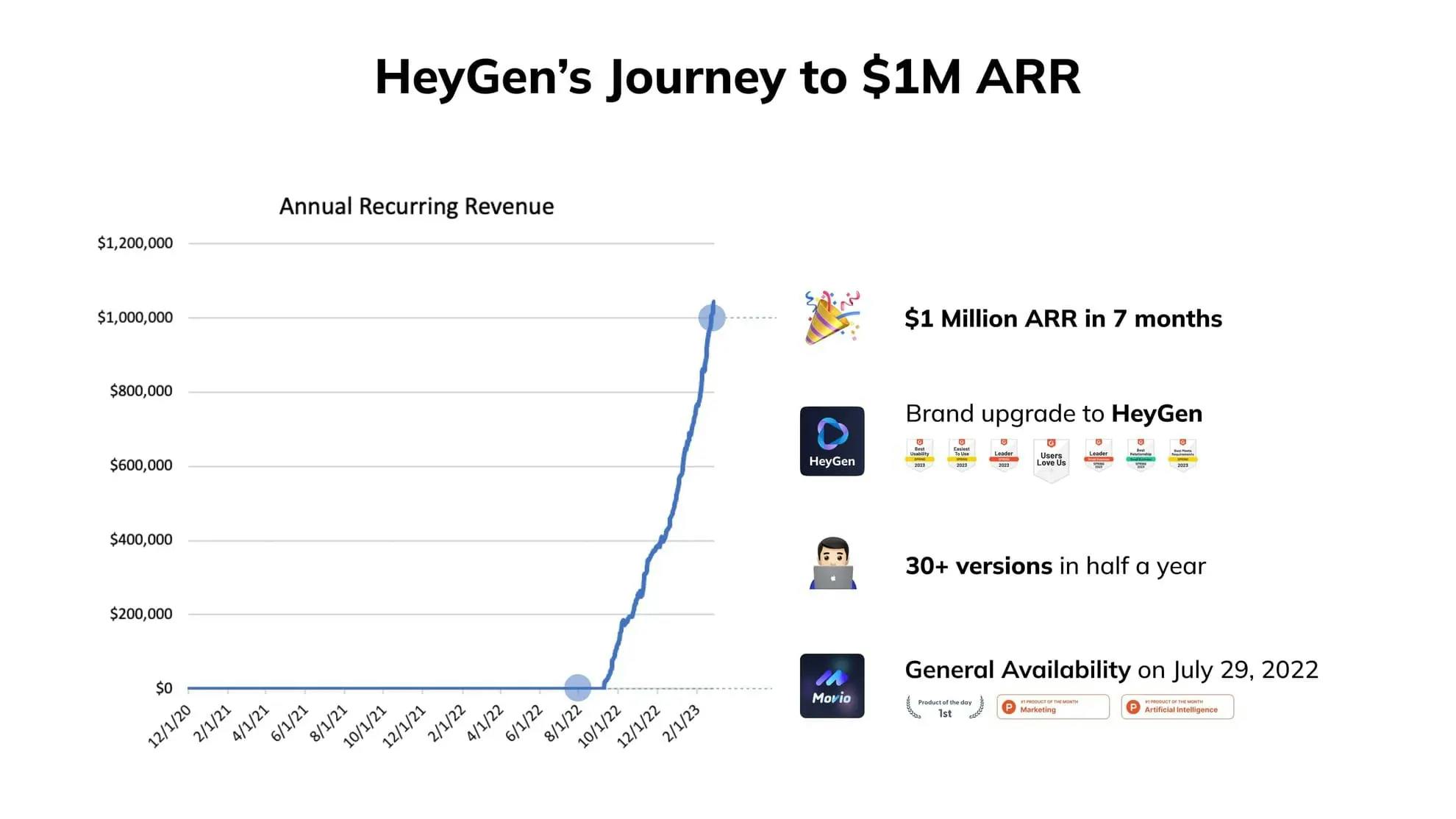
Source: HeyGen
Valuation
In March 2024, HeyGen raised a $60 million Series A from Benchmark at a $500 million valuation. Other investors in the company include Thrive Capital, BOND, SV Angels, and Conviction, as well as angel investors Neil Mehta, founder and managing partner of Greenoaks Capital, and Dylan Field, CEO of Figma. As of May 2025, HeyGen has raised a total of $69 million.
Key Opportunities
Increased Appetite for AI Integration
Companies are increasingly becoming data-driven and demonstrating an appetite to use technologies like HeyGen. For example, over 80% of marketers indicated interest in using AI as a tool to help them improve their ability to enhance customer service and improve targeted advertising in a 2023 survey. In April 2024, the Coca-Cola Company announced a five-year strategic partnership with Microsoft to leverage new generative AI capabilities to strategize new marketing content and foster workforce productivity. This builds on the company’s prior efforts to embrace AI, including appointing a global head of generative AI in 2023 and using OpenAI’s Dall-E 3 to create images that strengthen its brand identity. As more people and companies become familiar with generative AI capabilities and reimagine how they can be used in existing workflows, demand for HeyGen’s products are likely to increase.
Technological Advancements
Advancements in AI capabilities, computer vision, and natural language processing are expected to yield more sophisticated and capable video generation systems. Over the course of 2024 and 2025, the space saw an increase in open-source AI models, including those from Meta, Falcon, Mistral, and DeepSeek. These open-source models not only narrow the gap with proprietary systems but also accelerate innovation and lower the costs for businesses to introduce AI capabilities into their workflows. This could mean that there will be rapid improvement in AI video generation tools.
For example, OpenAI launched an updated version of Sora that runs at faster speeds with more capabilities within 10 months. Similarly, Runway has released an updated version of its video generation model every few months, from Gen-2 in March 2023 to Gen-3 in June 2024 and Gen-4 in March 2025. Each iteration provides users a wider range of styles, faster video processing speed, and more accurate human expressions to play with as they create content. As AI video generation companies seek to produce better and faster tools for content creation, HeyGen can continue to release new, improved, and creative products to compete and find its niche in an increasingly dense market.
Increased Use of Video Marketing
In 2023, 46% of US consumers made a purchase through a livestream event and indicated willingness to do so again. On Black Friday in 2024, TikTok Shop generated more than $100 million in sales. Between Black Friday and Cyber Monday, there was reportedly a 165% year-over-year increase in the share of TikTok shoppers. Social commerce on platforms like TikTok and Instagram has gained traction and is likely to continue, with 69% of regular TikTok users indicating that they would be willing to buy something from the platform in a 2021 survey.
The popularity of social commerce is growing globally as well. In China, an estimated $600 billion in goods were sold via livestream in 2024. These statistics suggest the value of video content marketing to customers who are developing more direct relationships with brands via social media platforms and to marketers who are seeking to create higher-quality videos to reach them. HeyGen’s interactive video avatars could set it apart from competitors by enabling it to deliver both video generation and customer care services.
Key Risks
Competitive Landscape
HeyGen faces significant competition from both established companies and startups in the AI-driven video generation market. Larger companies are acquiring smaller startups to integrate AI capabilities into their stack and expand their market presence. In July 2024, Canva acquired Leonardo AI, which had offered AI models for image creation in industries such as fashion, advertising, and architecture. In August 2024, Reddit acquired Memorable AI, a startup that used AI to create better ads, as its first acquisition since going public. Similarly, in October 2024, Panopto, an online video creation platform, acquired Elai, a text-to-video platform, to offer customers AI-generated content. These acquisitions are leading to the emergence of dominant players that offer comprehensive products for wide audiences, emphasizing the importance of HeyGen to continually innovate and adapt to maintain its competitive edge.
Regulatory Hurdles
Concerns about deepfakes, privacy, and copyright infringement may cause governments and other regulatory bodies to set restrictions on the development and use of AI-generated content. These regulations may also stoke fear around the potential misuse of HeyGen’s products, such as fears that people would use avatars to spread misinformation or promote harmful practices.
Communicating the trust and safety of its products has already been a challenge for HeyGen. In October 2024, Xu mentioned that the company needed to overcome initial doubts from users about HeyGen’s ethical policy. The company has built security safeguards like advanced user verification, including user consent to use avatars, and has protocols for rapid human reviews of all avatar verifications. Its priority on safety and privacy is also clear on its product pages, where each FAQ section includes an acknowledgement and response to concerns about data security and content moderation. It will be important for HeyGen to continue to be vocal about how its policies and products protect users and prevent malpractice to continue to see user growth.
Summary
HeyGen sits at the intersection of growing video consumption, increased demand for high-quality content, and the broader adoption of generative AI in business workflows. With tools for avatar-based video creation, video translation, personalization, and interactive avatars, HeyGen aims to simplify video production for a wide range of users. Its growth has been rapid: the company reached profitability in 2023, surpassed $35 million in ARR within a year, and now serves over 85K customers worldwide. Use cases have spanned marketing campaigns, nonprofit storytelling, and viral political speech translations, underscoring the platform’s flexibility and appeal across sectors.
Despite its momentum, HeyGen operates in a competitive and fast-evolving space. Large incumbents like Adobe and OpenAI continue to launch advanced video models, while peers like Runway and Synthesia are building adjacent or overlapping capabilities. Regulatory scrutiny around deepfakes and AI misuse also presents reputational and compliance risks. However, broader trends in AI adoption, digital marketing, and international content delivery continue to expand the company’s addressable market. If it maintains a strong pace of product innovation and user trust, HeyGen could remain a key player as the AI video landscape matures.
